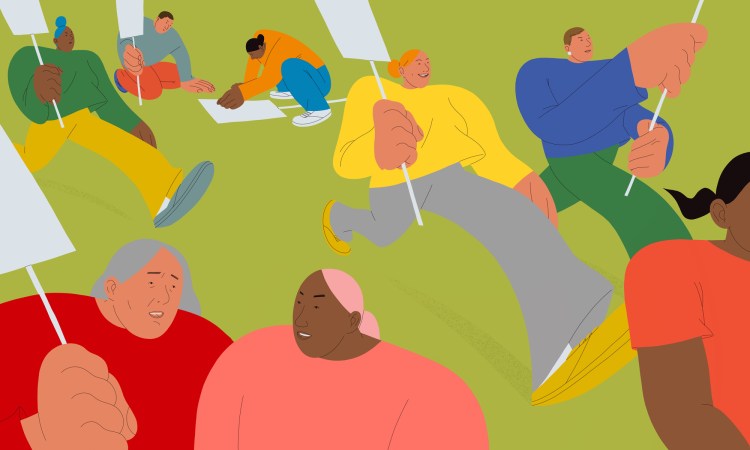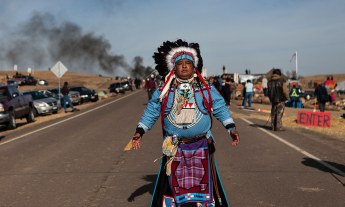
No matter what side you’re on, demonstrations, rallies, marches and protests are a powerful tool of political resistance — but yes, you can often count on law enforcement to make an appearance. Here’s a practical guide to US guidelines and laws that can help you minimize your risks while you get your message across.
How to prep for a protest
1. Find out if the organizers have a permit.
While the First Amendment guarantees freedom of speech and the right to peaceful assembly, members of law enforcement have some discretion to hold individuals and groups accountable to doing so at an appropriate “time, place, and manner.” If the organizers don’t have a permit, try to stay off private property, and refrain from using megaphones or amplifiers and blocking pedestrians, building entrances and traffic — doing any of these could result in your arrest. If the organizers do have a permit, stick to the area and time it was granted for.
2. Know your risks.
Do quick research into what counts as violations in your area. For instance, if you’re thinking about obscuring your face to protect your identity, google your state’s name and “anti-mask law” to see if your state has such a statute in effect — it prevents people from concealing their faces (outside of Halloween or for entertainment purposes) with masks, scarves or other accessories. Some New York City protesters in the Occupy movement were arrested in 2011 and 2012 under their state anti-mask law.
Also, know that the terms and conditions for arrest, search and seizure are not guaranteed for people who aren’t US citizens. If you are undocumented or have a green card or visa, different rules apply. Before attending demonstrations or marches, contact your local branch of the American Civil Liberties Union or an immigration lawyer to learn how your immigration status impacts your options and level of risk.
3. Make sure you have legal contacts close at hand (and on it).
If you’re arrested, you have the right to representation. Before the protest or event, program the number for the National Lawyers Guild or for your lawyer (if you have one) in your phone and write this information on your hand or arm. You may be wondering, “I always have my phone with me, so why do I need to write on myself?” Because officials may seize your belongings, including your devices, or you could get separated from them if there’s chaos.
4. Wear layers.
Dress for the possibility that you could end up waiting for a while in a law enforcement vehicle, holding cell, even an open field. Wear layers of clothing so you can adjust to different conditions.
5. Pack light.
Leave unnecessary items at home. The only things you must have are an ID and several quarters for the police-station phone. If you’re participating in an especially risky action and think it’s likely you’ll be arrested, bring two forms of ID (make sure one has a photo).
6. If you have a medical condition, pack your medication in its pharmacy-issued bottle or package.
This will enable the arresting officer to complete a “Medical Treatment of Prisoner” form so you can take your meds while being held. The form records all the details on your prescription bottle or package, including the medication name, dosing information, and the name and phone number for your prescribing pharmacy and doctor.
7. Consider everyone on your crew.
If you’re going to the protest with people you know, make sure you talk through these issues beforehand. Together, try to think about the potential consequences to anyone in your group if you all get arrested. Could they get fired? Deported?
What to do if you’re detained by law enforcement
1. Remain silent, and ask for a lawyer.
Take the police seriously when they say: “Anything you say can and will be used against you.” Even if you know you are completely innocent, just stop talking. If you are a US citizen, politely state that you are peacefully protesting and that your rights to assembly and free speech are protected under the First Amendment.
If officers keep asking you questions, calmly state: “Officer, I will remain silent. I’d like to speak with a lawyer.” You are not legally bound to answer queries without talking to to a lawyer (if you don’t have one, the police are obligated to provide you with access to a free attorney). Know that in some states, you are legally required to give your name if asked to identify yourself.
2. Just say “no” to searches.
You have the right to refuse to consent to a search of yourself and your possessions. Clearly say: “Officer, I do not consent to searches of my private property.” Do not offer to show them personal items to demonstrate your innocence — law enforcement may not need a warrant to confiscate or search any objects that they can see in the open.
3. Follow physical directives.
If officers ask you to lie down, do it. Always keep your hands where they can easily be seen, and do not walk or run away. Avoid doing anything that could be misconstrued by law enforcement as resisting arrest.
4. Don’t escalate the encounter.
Never respond physically to officers, or threaten them verbally. If they start behaving aggressively, ask any nearby observers with smartphones to record your arrest on camera. If you do this, state audibly that you are not resisting arrest and you are not consenting to a search. Ask arresting officers for their cards and badge numbers so that this information can be captured in the recording.
5. Save your complaint for later.
Police misconduct cannot be effectively addressed on the street in real time. If you believe that your civil rights have been undermined, file a complaint after your experience (but get the names and phone numbers of any witnesses before leaving the scene). As soon as you can after the incident, write down everything you can recall — the name of the law enforcement agency or department, officers’ names and badge numbers, patrol car numbers, exactly what happened in the order that it happened, witnesses and their contact information. Then file an official complaint with the police department’s civilian complaint board or the agency’s internal affairs division.
6. Leave as soon as you can.
If you’ve been detained but haven’t been arrested, ask: “Am I free to go?” If an officer gives you an answer that is unclear, ask again: “Am I being detained, or am I free to go?” If they say you are being arrested, they must tell you why. Then ask to speak to a lawyer and remain silent until you do.
Excerpted with permission from the new book Road Map for Revolutionaries: Resistance, Activism and Advocacy for All by Elisa Camahort Page, Carolyn Gerin and Jamia Wilson, published by Ten Speed Press, an imprint of the Crown Publishing Group, a division of Penguin Random House, LLC. Copyright © 2018 by Elisa Camahort Page, Carolyn Gerin and Jamia Wilson.
Watch Elisa Camahort Page’s talk at TEDxOlympicBlvdWomen:
Watch Jamia Wilson’s talk at TEDxYouth@Hewitt:











